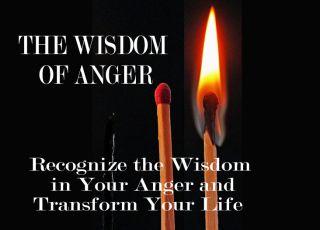Anger
The Wisdom of Anger
Your anger may have more to teach you than you think.
Posted March 1, 2023 Reviewed by Ekua Hagan
Key points
- Anger doesn't have to be eliminated. Instead, one can choose to relate to its message of legitimacy, worth, and efficacy.
- Anger encourages an individual to act upon meeting their needs and reaching their goals.
- Anger motivates people to improve themselves and create harmony in their lives.

Anger has a bad reputation. When it flares up, it can take control of our body, our thoughts, our senses, and our actions. We temporarily lose our judgment, regaining it only after our anger has subsided—often when it’s too late. When we are angry, we may lose our composure and dignity. It’s as if anger consumes us or takes us hostage, overwhelming our best intentions.
Many even believe that we would be better off without anger. This is hardly surprising, given its destructive consequences, such as aggression, violence, and terrorism.
But what if anger is a valuable ally, not an adversary to be defeated? While anger sometimes involves aggressive tendencies, it also carries great wisdom. It provides us with information about the world around us. Anger is an indication of a problem that needs to be corrected. Something is preventing us from experiencing harmony and wholeness—in our relationships, in our lives, or within ourselves.
In my 20-plus years as a psychotherapist, I’ve come to appreciate the potential of anger as a force for good. I’ve come to understand that anger is an internal signal that identifies our unmet needs and presents us with opportunities for course correction, healing, and growth. It motivates us to act toward meeting our needs and reaching our goals. It pushes us to right the wrongs we see in the world.
The purpose of anger
Anger has two main purposes. The first is to secure our safety and survival. We respond with anger when we are threatened or when our boundaries are violated. This built-in, protective kind of anger is raw and primitive. It gives us a boost of energy and power to overcome the threatening situation. It has a dominant, loud, explosive quality.
Yet, anger has a deeper and more profound purpose: It motivates us to improve ourselves and create peace and harmony in our lives. This second kind of anger is as elegant and as potent as the first, but it is subtler. While protective anger is instinctive and works below the level of consciousness, using anger for the purpose of healing, peace, and growth requires us to refine it deliberately and use it with mindfulness and kindness.
In its refined, awakened form, anger brings good to the world. In our personal lives, it helps us be honest about our own foibles and to have the courage to advocate for ourselves. You can think of anger as your own internal GPS. Whenever it arises, it is alerting you to a problem and giving you important information about what to do next. When you tune in to anger and use it as an internal GPS, you create an opportunity to redirect your intentions and actions positively toward love and harmony.
On a bigger scale, anger inspires us to take part in great movements for freedom and social justice. It is a vital part of our psychological and spiritual path toward awakening and growth.
How to uncover the wisdom of anger
Uncovering the wisdom of anger begins with feeling it fully. Yet, embracing your anger in this way might be very scary. Experiencing anger is not easy. We fear that the intensity of anger will overwhelm us and make us lose control. We’re ashamed that such a “negative” powerful emotion is part of our makeup. So we protect ourselves against anger, either by suppressing it or by acting it out in ways that make us feel temporarily powerful. While these may appear to be opposite reactions, ultimately both are ways to avoid truly facing our anger.
Trying to get rid of anger (or any other emotion) is unrealistic. It doesn’t work; anger does not disappear. It’s also unhealthy. The avoidance of anger only amplifies its negative force. And, as you may have discovered in your own life, acting impulsively to restore your sense of worth and power usually causes harm.
What we need is a willingness to experience anger without suppressing it or discharging it immediately. We must be willing to break through the thick crust and go deeper. When we have the courage to remain present with our anger, we can look directly at it. We can investigate and come to understand it, and we can extract its wisdom.
Feeling our anger takes courage. It requires us to cultivate skills like taking personal responsibility, practicing nonjudgmental mindfulness, and extending compassion to ourselves and others. But the effort is worth it. Pursuing the darkest side of anger will lead us to the brightest light within ourselves. Something that once seemed unacceptable is transformed into something rich and positive. The key is to work with anger instead of against it, moving toward anger rather than resisting it.
When you come to see anger as a compass, not an adversary, you shift your relationship with it. Rather than identifying with anger’s urge to action, or with its feelings of frustration and powerlessness, you now relate to its message of legitimacy, worth, and efficacy. This shift, in turn, frees you to grow through your anger. Guided by the attitude of compassion, you realize your power to choose peace and loving-kindness over disconnection and aggression.
If utilized properly, anger invites us to leave an old way of thinking and move toward a new level of being. It can be the gateway to clarity, equanimity, and happiness. It’s an opportunity to grow. When you pay attention to the messages your anger carries, you transform every aspect of your life. You become a better parent, spouse, friend, community member, and leader. In time, you uncover new aspects of yourself and integrate them to become more whole, more authentic, and more positive. You gain a deeper sense of achievement and well-being, and you relate to the world around you with a greater sense of harmony.
Anger, like a fire, is a primal force. Left unchecked, it can be destructive. Yet when it is used deliberately and wisely, it can be a powerful beneficial instrument—one that leads to enlightenment.




